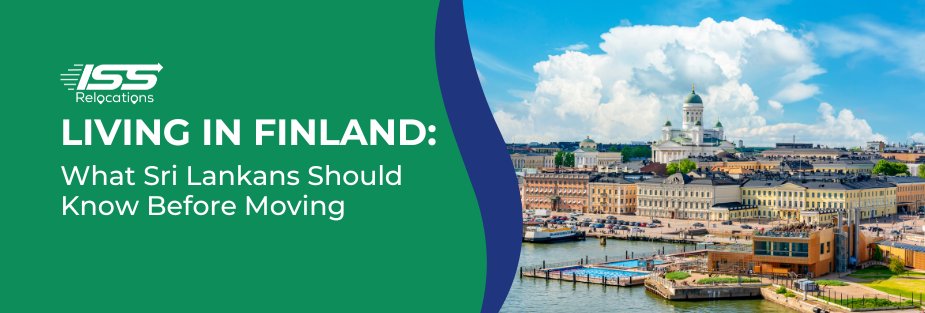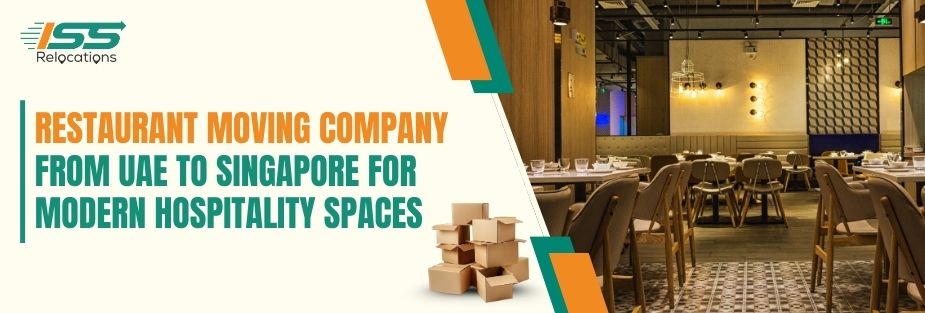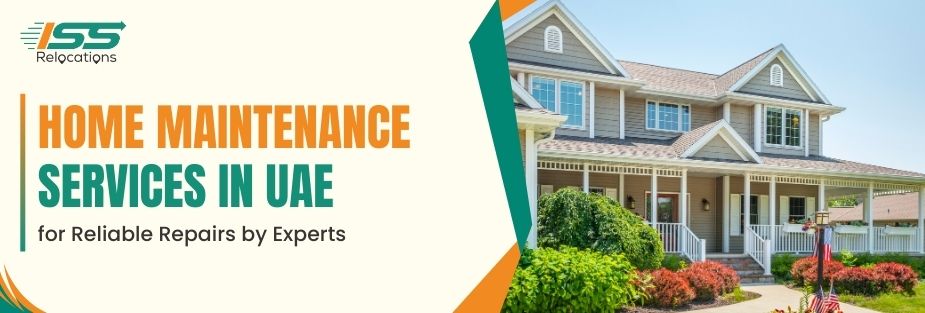
Living in Finland: What Sri Lankans Should Know Before Moving
For many Sri Lankans, the prospect of living in Finland offers a world of exciting opportunities and a unique way of life. Finland consistently ranks as one of the happiest countries globally, drawing people with its blend of rich culture, a robust welfare system, and a lifestyle rooted in nature and simplicity. As more Sri Lankans look beyond their borders for new experiences and growth, Finland’s strong sense of community, high-quality education, and thriving economy make it an attractive choice.
Adapting to Finland’s environment, however, requires a good understanding of its unique aspects. From adjusting to its seasonal climate and high cost of living to navigating the Finnish way of social interaction, there’s much to prepare for when considering living in Finland. With this guide, Sri Lankans can gain valuable insights into what to expect and how to make the most of this new chapter, starting with the right relocation support.
Moving to Finland?
Plan your move smartly with expert relocation guidance and support.
The Basics of Living in Finland: Key Things Sri Lankans Should Know
When planning a life in Finland, it’s essential to understand some foundational aspects that will help Sri Lankans feel more prepared and comfortable. From managing daily expenses to adapting to a new climate, there are several practical considerations to ensure a smooth adjustment to living in Finland.
Cost of Living in Finland
Finland is known for its high standard of living, which often comes with a higher cost than many might expect. While salaries generally align with these living expenses, it’s helpful for newcomers to understand typical costs.
- Housing: Rental costs vary widely, with urban areas like Helsinki being significantly more expensive than smaller towns. A one-bedroom apartment in the city center can range from €800 to €1,200 monthly, while the same outside city limits may be closer to €600.
- Food and Groceries: Groceries tend to be pricier than in Sri Lanka, with a standard weekly grocery bill costing around €40-€60 per person. Local markets may offer seasonal discounts, which can help offset costs.
- Transportation: Public transportation is highly reliable and well-connected, costing around €60-€100 for a monthly pass in major cities. Biking is also popular and affordable, especially in urban centers.
For those considering living in Finland, budgeting carefully will help ensure that lifestyle adjustments remain manageable. Many Sri Lankans also find it beneficial to explore cost-effective options such as shopping at local markets and using public transportation over private vehicles.
Finland’s Weather and Seasons
Finland’s climate is notably different from Sri Lanka’s tropical environment, with four distinct seasons and a substantial shift in daylight hours throughout the year.
- Winter: Winters are long and cold, lasting from November to March, with temperatures often dipping below -15°C. Snowfall is frequent, particularly in northern areas, which requires dressing in warm, layered clothing.
- Summer: Summer, from June to August, brings milder temperatures averaging 15°C to 25°C. These months offer extended daylight hours, known as the “Midnight Sun,” where the sun barely sets in the northern regions.
- Adapting to Seasonal Changes: Many Sri Lankans may find Finland’s colder climate challenging at first. Investing in quality winter clothing and using seasonal light therapy lamps can help newcomers adjust to shorter days and colder temperatures, making living in Finland more comfortable year-round.
Healthcare and Wellbeing
Finland’s healthcare system is highly regarded, providing extensive coverage and facilities. While residents benefit from universal healthcare, non-EU citizens, including Sri Lankans, should prepare to obtain private health insurance.
- Public Healthcare Access: Finland’s public healthcare system is affordable but may have long waiting times for non-emergency services.
- Private Health Insurance: International residents, particularly those on work or student visas, are often required to purchase private insurance to cover potential medical expenses. This insurance can also help expedite treatment in private healthcare facilities.
- Staying Healthy Year-Round: With colder weather and a different lifestyle, staying active through indoor activities like gyms or community sports is popular. Adapting to Finnish wellness practices, such as sauna use, can also contribute positively to wellbeing while living in Finland.
Talk To Us For Smooth Moving!
How ISS Relocations Simplifies Your Move to Finland
Moving internationally requires careful planning and trusted support, and ISS Relocations offers tailored solutions to make the transition to Finland seamless for Sri Lankans. Our services cover every aspect of the move, helping individuals and families settle confidently in their new Finnish surroundings. Here’s how ISS Relocations can assist with key moving needs:
Comprehensive Moving Plans for a Hassle-Free Start
ISS Relocations understands that every move is unique, especially when relocating to a country as distinctive as Finland. We provide customized moving plans, helping each client with their specific needs, timelines, and relocation goals. Our experts ensure all essentials—from initial assessments to final relocation arrangements—are handled efficiently, leaving no detail overlooked.
Our team also assists with planning the best routes and moving dates to ensure safe and timely delivery. With ISS by your side, living in Finland starts smoothly with a well-organized approach from day one.
Customs and Documentation Assistance
Relocating to Finland requires a range of documents and permits, particularly for non-EU residents. ISS Relocations offers full support with necessary paperwork, including customs clearance, visa applications, and residence permits. Our experience in international relocations makes the customs process straightforward, helping Sri Lankans avoid delays or unexpected costs.
- Customs Clearance: ISS ensures that your personal items meet all Finnish import regulations, from household goods to personal items.
- Visa and Permit Guidance: We provide assistance with visa options, explaining the requirements for Sri Lankan nationals moving to Finland for work, study, or family reasons.
Packing, Shipping, and Secure Storage Solutions
With ISS, moving personal belongings is secure, convenient, and managed with expert care. We offer professional packing services to ensure that valuable items are transported safely to Finland. For those with specific timing needs, ISS also provides secure storage facilities for short- or long-term requirements, giving clients flexibility with their move.
- Expert Packing Services: We handle items of all sizes, using durable materials to protect each belonging during transit.
- Global Shipping: Our network of international shipping partners ensures that items reach Finland on schedule, allowing clients to begin living in Finland without unnecessary wait times.
Post-Relocation Assistance for a Smooth Transition
Once in Finland, the journey of adaptation begins. ISS Relocations supports clients beyond just the physical move, offering resources and guidance to ease the cultural transition. Our post-relocation assistance includes tips on finding local services, understanding Finnish culture, and navigating public transportation, empowering new arrivals to feel more at home.
- Local Guidance: From setting up bank accounts to locating nearby grocery stores, ISS provides practical advice to help with everyday needs.
- Cultural Orientation: Our guidance on Finnish social norms and customs helps Sri Lankans integrate more comfortably, making the experience of living in Finland both enriching and enjoyable.
Read Also: Is Brazil a Good Place to Live for Sri Lankans? Ultimate Guide
Navigating Finnish Culture and Social Etiquette
Understanding Finnish culture and social etiquette can make a big difference in feeling connected and comfortable in your new surroundings. Finnish society values independence, privacy, and respect, making social interactions distinctly different from those in Sri Lanka.
Embracing Finland’s Values of Equality and Independence
Finnish culture is built on principles of equality and personal freedom, with a strong emphasis on individual autonomy.
- Gender Equality: Finland is a global leader in gender equality, with women participating actively in every sector, from government to business. Respect for all genders is deeply ingrained in Finnish society.
- Privacy and Independence: Finns greatly value personal space and independence. It’s common for social interactions to be more reserved and less expressive than in Sri Lanka, which may take some adjustment when living in Finland.
Sri Lankans who embrace these values can find it easier to integrate into Finnish society, especially by respecting others’ boundaries and enjoying a balanced sense of independence.
Language and Communication Tips
While Finnish is the primary language, many Finns speak English, especially in urban centers. However, learning basic Finnish phrases can enhance day-to-day interactions and show appreciation for the local culture.
- Learning Finnish: Finnish is not an easy language to master, but learning a few common phrases can help break the ice. Several free and paid language courses are available, both online and in local communities.
- Swedish as a Second Language: Finnish and Swedish are both official languages in Finland, though Swedish is more commonly spoken in certain regions. Understanding this linguistic dynamic can be helpful when exploring different parts of the country.
- Respecting Silence: Silence is a valued part of communication in Finnish culture. Pauses in conversation are normal and not meant to be uncomfortable. When living in Finland, Sri Lankans can adapt by practicing active listening and embracing quieter social settings.
Social Life and Making Connections
Finland may feel quieter socially compared to Sri Lanka, but there are plenty of opportunities to build friendships and a strong social network.
- Joining Clubs and Community Events: Many cities and towns offer clubs and activities where newcomers can meet others with similar interests, from sports clubs to cultural associations.
- Expat and Cultural Communities: For Sri Lankans living in Finland, connecting with expat groups can be a great way to ease into Finnish culture while staying in touch with familiar customs.
- Social Etiquette in Public Spaces: Public behavior in Finland is generally reserved. Speaking quietly in public spaces and respecting others’ privacy can go a long way toward feeling accepted and comfortable.
By respecting these cultural nuances, Sri Lankans can build positive relationships and find a welcoming community while adjusting to their new environment.
Working in Finland: Employment Opportunities and Requirements
Finland’s job market offers appealing opportunities, especially in fields like technology, healthcare, and engineering, making it an attractive choice for skilled Sri Lankan professionals. Understanding the requirements and expectations in the Finnish workplace can greatly ease the transition and make living in Finland a rewarding experience.
Finland’s Job Market and Demand for Skilled Workers
Finland’s economy benefits from a range of industries that frequently seek international talent to fill skill gaps, especially in sectors like technology and health services.
- Sectors with High Demand: Fields such as IT, engineering, education, and healthcare are actively recruiting foreign professionals. The demand for skilled workers, particularly in tech roles, aligns well with Finland’s focus on innovation.
- Job Search Resources: Many job portals, such as TE-Palvelut (the Finnish Employment Service) and other expat-specific sites, are ideal for finding employment. Networking events, job fairs, and LinkedIn are also valuable for those living in Finland and seeking professional connections.
Work-Life Balance and Employee Rights
Finnish workplaces prioritize a healthy work-life balance, offering several benefits that help employees thrive both personally and professionally.
- Flexible Work Hours: Many companies offer flexible hours or remote work options, a trend that has grown in popularity, especially in the tech industry.
- Employee Benefits: Standard benefits include paid parental leave, generous holiday time, and social security. Finland’s work culture encourages work-life balance, which can be a positive adjustment for Sri Lankans accustomed to different work expectations.
- Employee Rights and Union Support: Finland’s laws protect employee rights strongly, covering fair wages, safe working environments, and nondiscriminatory practices. Unions are also highly supportive and prevalent across industries, which can add a layer of security for those living in Finland.
Securing a Work Permit or Residence Permit
Securing the right permits is crucial for legally working in Finland, and understanding the options available for Sri Lankans can simplify the process.
- Residence Permit for Employment: Non-EU citizens generally need a residence permit to work in Finland. Applicants must have a confirmed job offer, and employers often assist with the application process.
- Self-Employment or Entrepreneurship: For those interested in self-employment, Finland offers permits specifically for entrepreneurs. This process requires a clear business plan and adequate funding.
- Visa Processing Time and Fees: Visa and permit processing can take several weeks, so it’s important to plan ahead. Applicants can expect fees ranging from €350 to €500 depending on the visa type.
With a well-prepared application and the right guidance, Sri Lankans can embark on a fulfilling professional journey while living in Finland, leveraging these opportunities to build a successful career.
Education in Finland: Opportunities for Families Moving with Children
Finland is globally recognized for its excellent education system, which is known for its focus on student wellbeing, creative learning, and inclusivity. For Sri Lankan families planning on living in Finland, the educational opportunities for children and young adults are both enriching and accessible.
Finland’s Renowned Education System
The Finnish education model prioritizes the holistic development of children, fostering independence, critical thinking, and collaboration.
- Student-Centered Learning: Finnish schools focus on hands-on learning, smaller class sizes, and a flexible curriculum. Education is free, and children are encouraged to learn through experience and creative exploration rather than rigid testing.
- Pre-School to Secondary Education: Pre-school education is available for children starting at age 6, with compulsory education from ages 7 to 16. After that, students can choose upper secondary schooling, which prepares them for higher education.
- Inclusive Environment: Schools in Finland prioritize inclusion, providing support for students with different learning needs. This inclusive approach helps create a positive environment for children living in Finland, making it easier for Sri Lankan children to adapt and thrive.
Higher Education for International Students
Finland’s universities offer excellent opportunities for higher education, especially in fields like engineering, business, and environmental sciences.
- University and Polytechnic Options: Finnish universities focus on academic research, while polytechnic schools, or universities of applied sciences, provide more practical, career-oriented education. Both options are available for international students, with many programs offered in English.
- Affordable and Quality Education: Education in Finland is cost-effective, with relatively low tuition fees compared to other Western countries. Scholarships are available for international students based on merit and need.
- Pathways to Employment: Many higher education institutions collaborate with industries, providing internships and work placements that can lead to employment after graduation. This allows Sri Lankan students living in Finland to gain valuable local experience and potentially secure a job in their field.
For young professionals and students considering a future in Finland, international experience can make all the difference. Explore how global mobility internships can open doors to career success abroad.
Language of Instruction and Integration Programs for Kids
For families moving from Sri Lanka, adapting to a new educational system may feel challenging, but Finland’s schools offer resources that facilitate a smooth transition.
- Language Options: Although Finnish is the primary language of instruction, many schools offer English or Swedish as alternatives, especially in larger cities. This can ease language barriers for Sri Lankan children adjusting to living in Finland.
- Integration Programs: Integration programs help international students learn Finnish and adapt to the local culture. These programs are available at various educational levels, offering a blend of language learning and academic support.
- After-School Activities: Finnish schools offer numerous extracurricular activities that help children build social connections, from sports to arts. This enriches the learning experience and supports social integration for children new to Finland.
By engaging with Finland’s education system, Sri Lankan families can provide their children with a nurturing and dynamic environment that encourages lifelong learning and growth while living in Finland.
Essential Tips for Daily Life in Finland
Adjusting to daily life is an important part of living in Finland, as small lifestyle changes can greatly enhance the overall experience. From navigating transportation to enjoying local cuisine, these tips will help Sri Lankans feel more at home in their new surroundings.
Transportation and Getting Around
Finland’s public transportation system is efficient and widely used, making it easy to commute without a personal vehicle.
- Public Transport Options: Cities like Helsinki, Tampere, and Turku offer well-connected bus, tram, and train networks. A monthly pass typically costs between €60 and €100, which is a cost-effective choice for daily travel.
- Cycling Culture: Cycling is a popular, eco-friendly transportation option, with many dedicated bike lanes in cities. Bikes are easily available for rent, making it simple for residents to commute by bike during the warmer months.
- Driving and Licenses: For those who prefer to drive, converting a Sri Lankan license to a Finnish one is possible after living in Finland for six months, although international licenses are accepted for short-term use.
Read Also: A Guide to Denmark Regions for Expats Relocating from Sri Lanka
Grocery Shopping and Eating Out
Understanding local grocery options and dining habits can simplify the adjustment to living in Finland.
- Grocery Stores: Major Finnish grocery chains include K-Market, S-Market, and Lidl, with fresh produce and essentials. While imported items may be pricier, locally sourced foods are more affordable.
- Dining Out: Dining out is more expensive compared to Sri Lanka, so many residents cook at home. However, cities like Helsinki offer diverse cuisine, including South Asian restaurants where Sri Lankans can find familiar dishes.
- Traditional Finnish Dishes: Embracing local food like salmon soup (lohikeitto), rye bread, and Karelian pies (karjalanpiirakka) can be a fun way to experience Finnish culture.
Exploring Nature and Outdoor Activities
Finland’s natural beauty is one of its greatest attractions. For those living in Finland, enjoying the outdoors offers a way to connect with the local way of life.
- National Parks and Hiking Trails: Finland has numerous national parks and trails for hiking and camping. Exploring these landscapes is popular, particularly in summer.
- Winter Sports: In winter, residents can enjoy skiing, ice skating, and snowshoeing. Many towns and cities have skating rinks and ski resorts that are accessible for beginners.
- The Finnish Sauna Tradition: Saunas are deeply rooted in Finnish culture, and nearly every home or apartment complex has access to one. This practice is both a social activity and a way to relax, particularly during the colder months.
Wrapping Up
Living in Finland offers a unique experience filled with opportunities to learn, grow, and adapt to a new way of life. From navigating the job market and enjoying a world-class education system to embracing Finnish customs and exploring the natural beauty, Sri Lankans can find a welcoming and enriching environment in Finland.
As part of this journey, ISS Relocations is here to support every step, from the logistics of moving to practical guidance for settling in. With ISS as your partner, you can focus on experiencing all the best aspects of Finnish life while we handle the complexities of the move.
Plan Stress-free Move with Top Moving Company in UAE - ISS Relocations

Frequently Asked Questions
Is Finland expensive to live in compared to Sri Lanka?
Yes, the cost of living in Finland is generally higher, particularly in terms of housing, groceries, and dining out. However, careful budgeting and exploring cost-effective options can make the transition manageable.
Do I need to learn Finnish before moving?
While not essential, learning basic Finnish can enhance your daily life, especially in smaller towns. Many Finns speak English, so adjusting without Finnish is possible, particularly in cities.
Can Sri Lankan children attend public schools in Finland?
Yes, public education is free in Finland and widely accessible to international children. Many schools offer Finnish language support to help non-native speakers adapt.
What are some job opportunities for Sri Lankans in Finland?
Finland has demand in fields like IT, healthcare, and engineering. Exploring these sectors through job portals and networking can help Sri Lankans find suitable positions.
How does ISS Relocations assist with international moves to Finland?
ISS Relocations provides end-to-end moving support, including packing, customs assistance, and post-relocation guidance, ensuring a smooth transition for Sri Lankans moving to Finland.
Is Finland a good place to live in?
Yes, Finland is one of the best places to live due to its high quality of life, excellent education system, universal healthcare, and breathtaking natural beauty. It also ranks highly for safety and work-life balance. ISS Relocations helps you transition smoothly to living in Finland, offering expert relocation services tailored to your specific needs.
How can I move to Finland from Sri Lanka?
Moving to Finland from Sri Lanka involves obtaining a visa based on work, study, or family reunification, arranging housing, and preparing for cultural and logistical adjustments. ISS Relocations provides comprehensive support for your relocation, including visa assistance, packing, shipping, and settling-in services, ensuring a seamless move to Finland.
Moving Company - Recent Blog
Stay informed and prepared for your next move with our latest blogs on moving services in the UAE. From expert packing tips to international relocation guides, ISS Relocations brings you up-to-date insights to make your moving experience smoother, safer, and stress-free.










